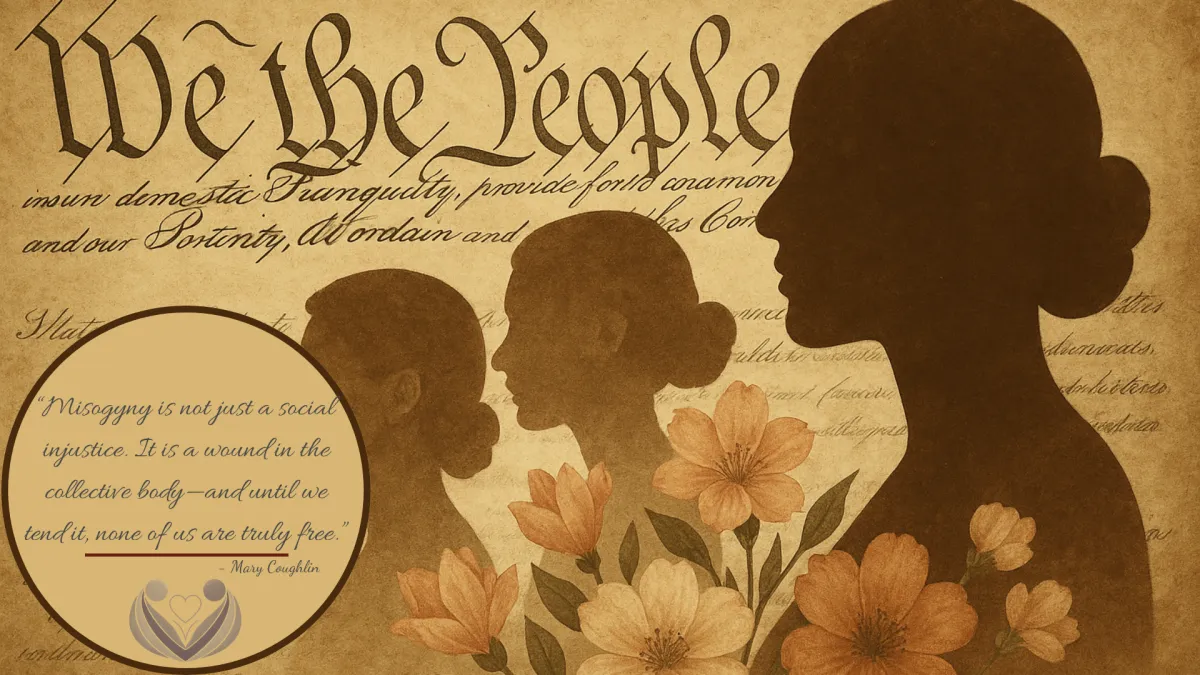
The Other Half — Misogyny, the ERA, and the Legacy of Exclusion
“Misogyny is not just a social injustice. It is a wound in the collective body—and until we tend it, none of us are truly free.” — Mary Coughlin
The Other Half — Misogyny, the ERA, and the Legacy of Exclusion
Developmental Care and Constitutional Blind Spots
From the beginning, the American project has spoken in the language of “We the People.”
But it has rarely meant all of us.
Women—half the population—were never named in the Constitution.
Not as equals. Not as voters. Not as rights-bearers.
And even today, after centuries of advocacy, organizing, and uprising, we still do not have an Equal Rights Amendment enshrined in our founding document.
This omission isn’t an oversight. It’s a symptom.
A symptom of a deeper cultural pathology that defines women’s worth by utility and silence.
A symptom of how patriarchy, like white supremacy, depends on invisibility to maintain its illusion of order.
A symptom of a nation still unsure whether care work, body autonomy, and maternal wisdom are threats—or treasures.
Developmental Care and Constitutional Blind Spots
In trauma-informed developmental care, we understand that exclusion has consequences.
When a caregiver’s voice is ignored, outcomes suffer. When maternal instincts are dismissed, babies are put at risk. When we treat nurture as “soft,” we compromise survival itself.
What happens to a society that builds entire systems while leaving out the wisdom and labor of women?
What happens to a NICU team that makes decisions without the mother or birthing parent?
What happens to democracy when more than half of its citizens are treated as an afterthought?
We live the answers to those questions every day:
Gender pay gaps in healthcare and policy roles
Black maternal mortality rates rising from systemic neglect
The burnout of nurses, mothers, and caregivers, expected to give everything and ask for nothing
A country willing to police women’s bodies but not protect their rights
Misogyny as a Public Health and Democratic Crisis
Let’s name this plainly:
Misogyny is a trauma.
And trauma thrives in silence.
We cannot build a trauma-informed world—much less a trauma-informed democracy—while tolerating systems that continue to extract from, legislate over, and gaslight the feminine.
This isn’t just about fairness. It’s about flourishing.
About building a society that understands care is not weakness—it’s wisdom.
That embodiment is not shameful—it’s sacred.
That love, protection, and connection are not luxuries—they are the very foundations of collective resilience.
It’s time to finish the sentence: “We the People” means all of us.
Reflection Prompt
Where in your practice, your relationships, or your worldview have you internalized the legacy of misogyny?
What might change if you trusted and centered the wisdom of the feminine—in yourself and others?
We cannot rewrite the past—but we can reclaim our power to shape what comes next.
The work of reimagining democracy is not abstract—it lives in the daily decisions we make to honor dignity, center voice, and dismantle exclusion.
Because the future we long for will not be gifted to us.
It must be woven—thread by thread, truth by truth, care by care.
And the next thread?
It lives where care and control collide—in the NICU, in the clinic, in the conversation between clinician and family.
Join me in the next post as we explore:
Post 4: Democracy in the NICU — Care, Consent, and Control
Until then—
With care, courage, and an unwavering belief in our capacity to heal,
Weave on, my friend.
—Mary
P.S. Ready to step deeper into this work?
If today’s reflection stirred something in you—if you’re craving a way to integrate these values into your work, your leadership, your legacy—
You may be ready to become a Trauma-Informed Professional (TIP).
Learn more about TIP 2.0 and how it’s helping clinicians, educators, and advocates reimagine care from the inside out.
Explore TIP ➝ https://www.caringessentials.net/tip-certificate-program
